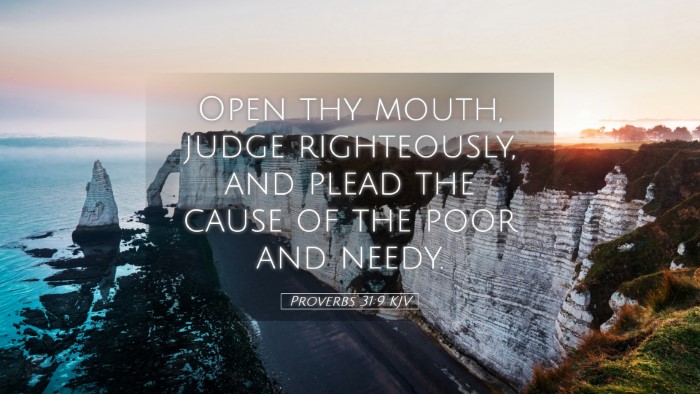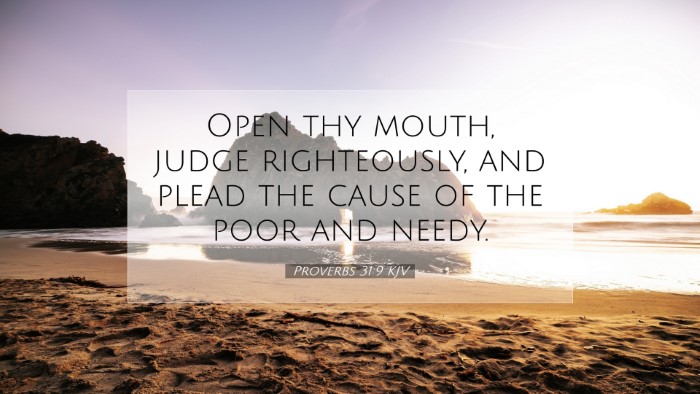Commentary on Proverbs 31:9
Scripture Reference: Proverbs 31:9 - "Open your mouth, judge righteously, and plead the cause of the poor and needy."
Introduction
The verse Proverbs 31:9 serves as a profound reminder of the ethical responsibilities entrusted to individuals, particularly leaders and judges. It calls for open dialogue, decisive judgment, and advocacy for those who are marginalized. The insights derived from various public domain commentaries provide a rich tapestry of understanding on this verse, highlighting its implications for justice, compassion, and moral integrity.
Exegesis of Proverbs 31:9
- Open Your Mouth: This directive suggests an active engagement in speaking out. The mouth is a powerful tool for advocacy. According to Albert Barnes, this phrase implies that one must not remain silent when injustice prevails.
- Judge Righteously: The call to judge righteously indicates a standard of fairness and equity. Matthew Henry emphasizes that righteous judgment aligns with divine principles rather than human biases. It is essential for those in authority to ensure that their judgments mirror God’s justice.
- Plead the Cause: In the context of pleading, Adam Clarke elucidates that it reflects a judicial or intercessory role, advocating for those who cannot defend themselves. This is particularly vital for the 'poor and needy'—groups often overlooked in societal structures.
Thematic Exploration
1. Advocacy for the Marginalized
Integral to this verse is the biblical theme of justice for the vulnerable. The poor and needy are to be defended, illustrating God’s heart for the marginalized. This responsibility is not limited to social leaders; it extends to all believers, urging them to embody justice and mercy.
2. The Role of Speech in Justice
Communication is highlighted as a foundational aspect of justice. Henry notes that the expression of one’s beliefs through speech can influence social dynamics. Thus, Christians are called to speak truth into situations of injustice, aligning their words with God’s truth.
3. Righteousness as a Standard
Righteousness serves as the cornerstone for effective judgment. Barnes asserts that a judge or leader must be impartial and just, evaluating situations based on truth rather than favoritism. The call to "judge righteously" promotes integrity within positions of influence.
Practical Applications
- Personal Reflection: Individuals should assess their own speech and actions, ensuring they align with God’s expectations for justice.
- Community Engagement: Pastors and leaders should prioritize advocacy initiatives within their communities, addressing the needs of the poor and social injustices.
- Education on Justice: Educational programs focusing on biblical justice should be promoted within church contexts, equipping believers to respond to societal needs.
Theological Significance
This verse not only addresses human interpersonal relations but also reflects the character of God Himself—who is just and compassionate. Understanding Proverbs 31:9 aids in recognizing the divine mandate for justice, which has profound implications in a believer's life as they are called to represent God's kingdom on earth.
Conclusion
In conclusion, Proverbs 31:9 serves as a vital reminder to open our hearts and mouths in defense of justice. The insights from Matthew Henry, Albert Barnes, and Adam Clarke provide foundational understanding for pastors, students, and theologians, emphasizing the ongoing need for righteous judgment and advocacy in today's world. Embracing these principles can effectively transform communities and uphold God’s justice.


